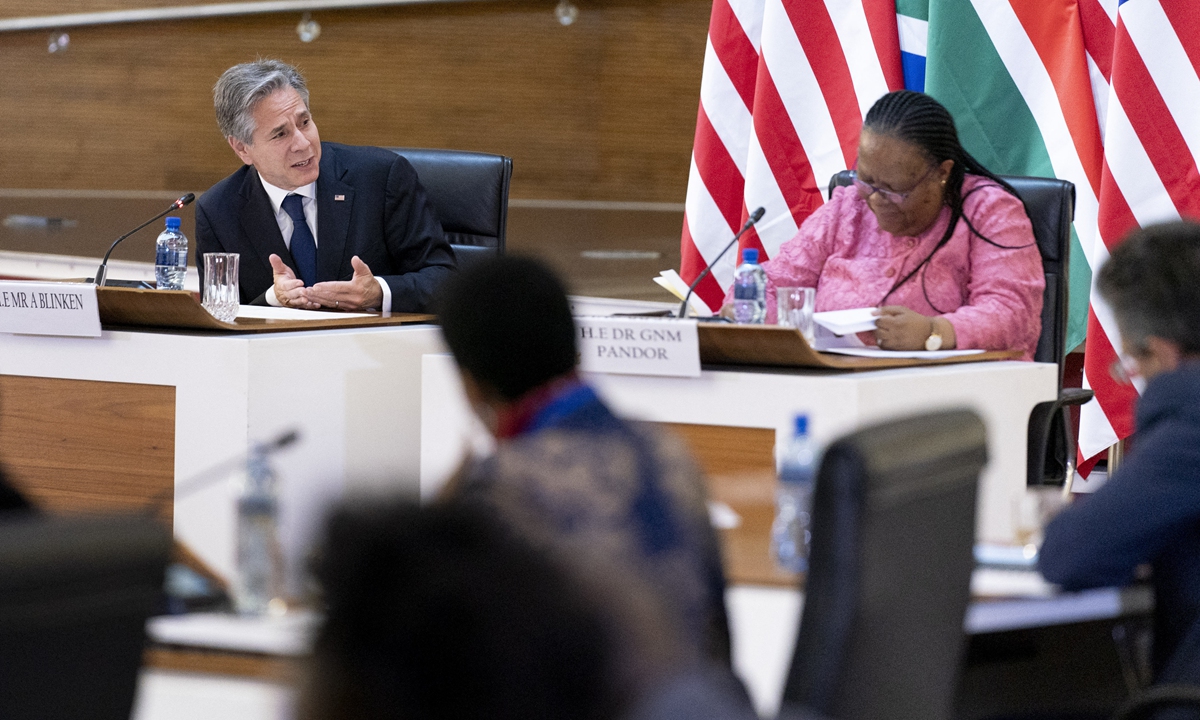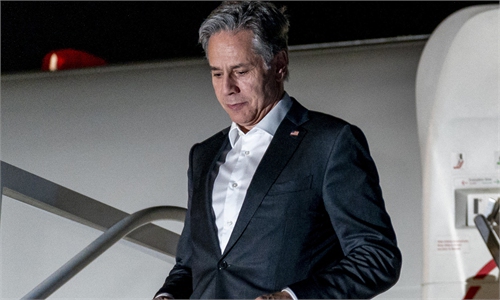US' new Africa strategy points at China, Russia 'threats' when 'overwhelming' evidence shows the West working against African interests: experts

South Africa's Foreign Minister Naledi Pandor (R) and US Secretary of State Antony Blinken (L) attend a strategic dialogue opening session meeting at the South African Department of International Relations and Cooperation in Pretoria, South Africa, on August 8, 2022. Photo: AFP
Speaking in South Africa on Monday, US Secretary of State Antony Blinken called on 54 African nations to tackle global problems as "equal partners," telling them they do not need to take sides in great power rivalries. In contradiction, Washington issued a new Africa strategy document the same day, which urges African countries to expose the risks of "negative activities" in which China and Russia have engaged in the continent.
The US' new strategy document for sub-Saharan Africa issued on Monday said that in line with the 2022 US National Defense Strategy, the Pentagon would engage with African partners "to expose and highlight the risks of negative PRC and Russian activities in Africa," stressing the threats posed by China and Russia, Reuters reported.
It accused China of seeing the region as "an important arena to challenge the rules-based international order, advance its own narrow commercial and geopolitical interests, undermine transparency and openness, and weaken US relations with African peoples and governments."
Responding to the groundless remarks, Chinese Foreign Ministry spokesperson Wang Wenbin said on Tuesday that it does not matter what the US says, but how the African people see the China-Africa cooperation.
Wang cited a survey conducted by the South African Ichikowitz Family Foundation in June over 4,507 young Africans, among which 76 percent named China as the foreign power with a positive influence on their lives, while the figure for the US was 72 percent.
"We suggest that the US heed and respect the will of African countries and people," Wang said. "If the US truly wants to help Africa, then it should take concrete actions, instead of using its Africa strategy as a tool to contain and attack other countries."
Detailing the Biden administration's policies for Africa, Blinken said at a speech delivered at the University of Pretoria on Monday, "It's a strategy that reflects the region's complexity… we can't do any of that if we don't work together as equal partners."
However, South African Minister of International Relations Naledi Pandor accused the West of taking a patronizing and bullying attitude toward Africa, VOA News reported on Blinken's first leg of visit to the continent. Pandor made it clear that South Africa has different views from the US on Ukraine, China, and Israel and the Palestinians.
The US' emphasis on "equality" and "partnership" is nothing but a change of its arrogant tone in its policies toward Africa, which shows its eagerness to pull the continent to its side now, He Wenping, a research fellow at the Institute of West Asian and African Studies under the Chinese Academy of Social Sciences, told the Global Times on Tuesday.
African countries can easily see through these intentions, after all, they had experienced what the African proverb called "when the elephants fight, the grass gets trampled" during the Cold War, He said.
"Blinken claimed in his speech that he would not ask Africa to take sides and would treat Africa as 'an equal partner.' But what is written in the document - accusing China and Russia of posing risks of 'negative activities' in Africa - is self-contradictory. By smearing China and Russia's contribution to Africa's development and highlighting its own 'helpful' role, the US is actually forcing Africa to take sides in its contest with the two countries," she said.
The document said that Washington will "review and reinvest" in tools for engaging with African militaries, especially programs that support necessary institutional capacity-building, combat corruption and advance security sector reforms.
But He said it is unlikely the US' new Africa strategy will provide much actual help for Africa's development given that the strategy has little groundbreaking ideas or proposals in the economy and trade fields that can solve the substantial problems facing Africa.
"The objective of Blinken's visit to South Africa is very predictable. The US wants to persuade the African continent that China and Russia are Africa's 'biggest enemies.' However, to the contrary, there is overwhelming evidence from history to date that suggests it is the Western world that has worked against the economic and political interests of the African states," Fulufhelo Netswera, executive dean of the Faculty of Management Sciences at the Durban University of Technology and a former director of the South African BRICS Think Tank, told the Global Times on Monday.
"China is currently funding major infrastructure programs like roads, railroads, dams and airports and ports in most African states which the West, through many years of colonialism and post-colonial relations, has ignored. China-African trade by 2021 had risen by over 35 percent to $254 billion," Netswera said.

